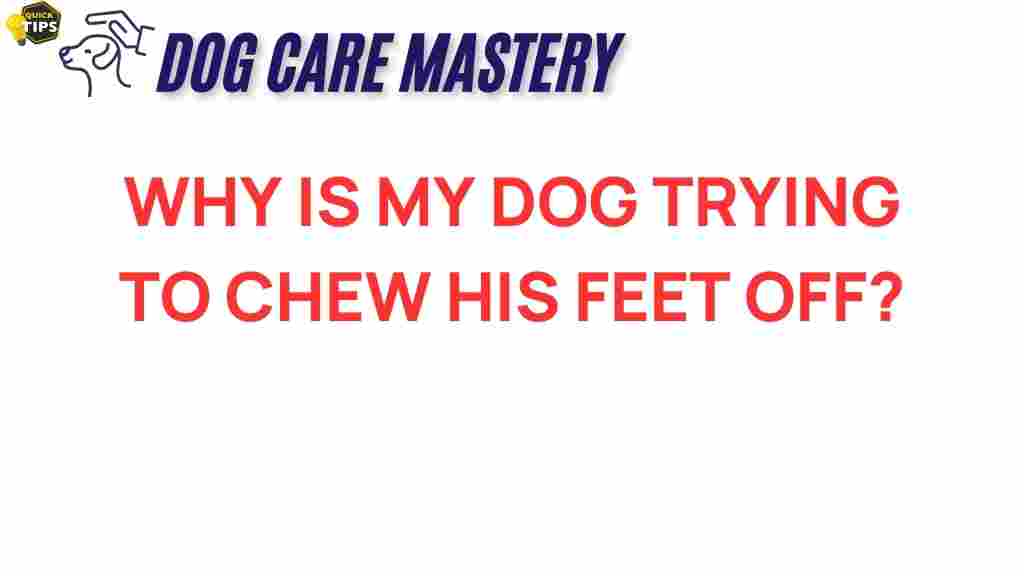Understanding Dog Behavior: Why Is My Dog Chewing His Feet?
As a dog owner, you may have noticed your furry friend engaging in some puzzling behaviors. One of the most common concerns is when a dog starts to chew on his feet. While this behavior might seem trivial at first, it can be a sign of underlying issues that require attention. In this article, we will delve into the reasons behind this behavior, explore potential health concerns, and provide tips for managing and altering it. Understanding dog behavior is essential to ensure a happy and healthy life for your pet.
Common Reasons for Foot Chewing in Dogs
There are several reasons why dogs may chew on their feet, ranging from allergies to boredom. Here are some common causes:
- Allergies: Dogs can suffer from various allergies, including food allergies, environmental allergies (like pollen or dust), or contact allergies (such as certain fabrics or chemicals). These allergies can lead to itching and discomfort, prompting your dog to chew his feet.
- Infections: Fungal or bacterial infections can cause inflammation and irritation in your dog’s paws, leading to excessive chewing. Conditions like pododermatitis are common culprits.
- Parasites: Fleas, ticks, and mites can cause intense itching, prompting your dog to chew at his feet in an attempt to relieve the discomfort.
- Dry Skin: A lack of moisture in the skin can lead to dry, flaky, and itchy paws. This condition might be exacerbated by seasonal changes or environmental factors.
- Boredom or Anxiety: Dogs are intelligent creatures that need mental and physical stimulation. Lack of exercise or boredom can lead to compulsive behaviors, including chewing on their feet.
- Paw Injuries: If your dog has an injury, such as a cut or thorn stuck in his paw, he might chew to soothe the pain or irritation.
Identifying the Cause of Your Dog’s Behavior
To effectively address your dog’s foot chewing, it’s crucial to identify the underlying cause. Here’s a step-by-step process to help you narrow it down:
- Observe Your Dog: Pay attention to when and how often your dog chews his feet. Is it constant, or does it happen at specific times (like after walks or during certain seasons)?
- Check for Allergies: Look for signs of allergies, such as redness, swelling, or excessive licking. If you suspect allergies, consult your veterinarian for allergy testing.
- Inspect His Paws: Examine your dog’s paws for any injuries, foreign objects, or signs of infection. Look for swelling, discharge, or an unusual smell.
- Monitor His Environment: Consider any recent changes in your dog’s environment, such as new cleaning products, floor treatments, or changes in his diet.
- Evaluate His Lifestyle: Assess your dog’s daily routine. Is he getting enough exercise and mental stimulation? Boredom and lack of physical activity can lead to destructive behaviors.
Seeking Professional Help
If your observations do not yield clear answers, or if your dog’s chewing behavior persists, it’s best to consult a veterinarian. They can provide a thorough examination, perform necessary tests, and suggest appropriate treatments or lifestyle changes.
Managing and Altering the Behavior
Once you’ve identified the cause of your dog’s foot chewing, you can take steps to manage or alter the behavior. Here are some effective strategies:
- Allergy Management: If allergies are the culprit, your veterinarian may recommend dietary changes, antihistamines, or topical treatments to soothe the skin.
- Regular Grooming: Keep your dog’s coat clean and free of debris. Regularly check and clean his paws to prevent irritations and infections.
- Parasite Control: Use vet-recommended flea and tick prevention products to keep your dog free from parasites.
- Provide Stimulation: Engage your dog in regular play and exercise. Puzzle toys, obedience training, and interactive games can keep his mind occupied and reduce boredom-related chewing.
- Use Protective Gear: If necessary, consider using an Elizabethan collar or protective booties to prevent your dog from chewing while you address the underlying issue.
- Behavior Modification: If the chewing is due to anxiety or stress, training techniques such as desensitization and counter-conditioning can be helpful. A professional dog trainer or a behaviorist can assist with these methods.
When to Consult a Veterinarian
It’s important to seek veterinary advice if:
- The chewing behavior has persisted for more than a few days.
- You notice signs of pain, swelling, or discharge in your dog’s paws.
- Your dog is excessively licking or chewing other parts of his body.
- He shows signs of distress, such as whining or refusing to walk.
Early intervention can prevent more serious health issues, so don’t hesitate to reach out to a professional.
Conclusion
Understanding your dog’s behavior is key to addressing issues like foot chewing. By identifying potential causes and implementing effective management strategies, you can help your furry friend find relief. Remember that patience is essential; behavioral changes may take time. Always consult with a veterinarian if you have concerns about your dog’s health or behavior.
For more information on dog behavior and training tips, check out our comprehensive guide. Additionally, consider visiting the American Kennel Club for expert advice on dog care and behavior.
This article is in the category Behavior and created by dogcaremastery Team
